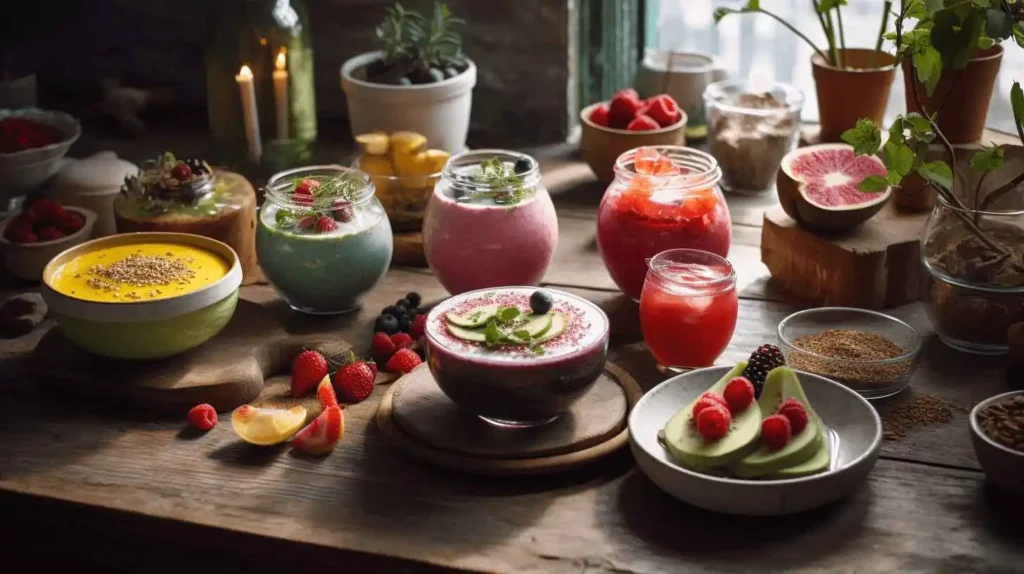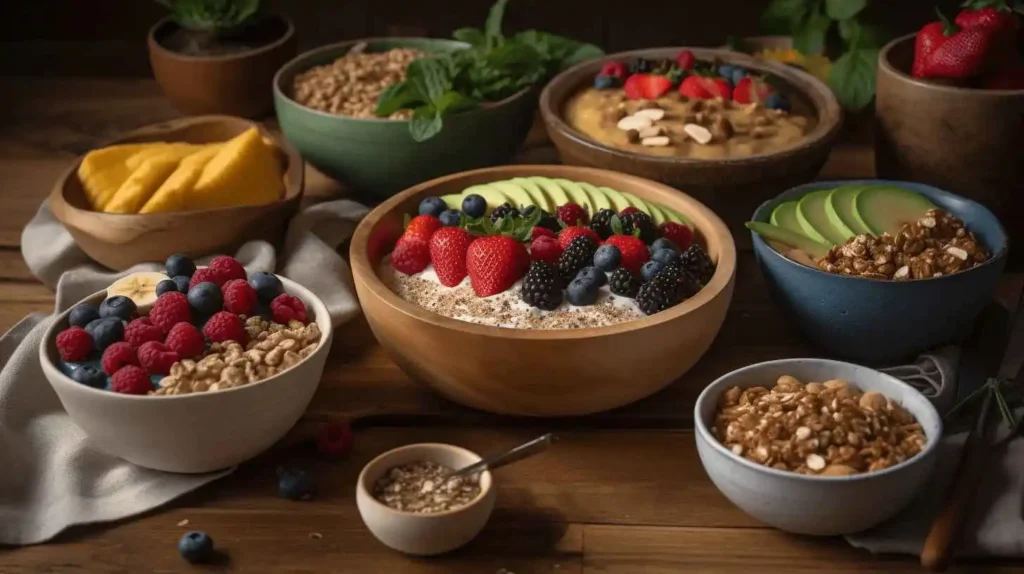Eating a nutritious breakfast is essential for starting your day off right. In fact, a growing number of people are turning to plant-based whole food breakfasts not only for their myriad health benefits but also for their environmental sustainability and undeniable deliciousness. Specifically, these breakfasts focus on minimally processed, nutrient-dense ingredients such as fruits, vegetables, whole grains, nuts, seeds, and plant-based proteins. As a result, they provide a wholesome and satisfying way to fuel your mornings.
Whether you’re vegan, vegetarian, or simply looking to incorporate more plant-based meals into your diet, there are countless ways to create a wholesome and satisfying morning meal.
In this article, we’ll explore a variety of plant-based whole food breakfast ideas and recipes to make your mornings both nourishing and exciting. From smoothie bowls and overnight oats to savory dishes like avocado toast and tofu scrambles, you’ll find tips, tricks, and inspiration to transform your breakfast routine.
CONTENT SUMMARY:

Why Choose Plant-Based Whole Food Breakfast Options?
Health Benefits of Plant-Based Whole Food Breakfasts
Starting your day with plant-based whole food breakfast ideas can significantly enhance your overall well-being. For instance, these meals are rich in essential nutrients like fiber, vitamins, and antioxidants, which not only nourish your body but also support multiple aspects of your health.
- Improved Digestion: Fiber-rich foods like fruits, vegetables, and whole grains aid digestion and promote gut health.
- Heart Health: Plant-based meals are low in saturated fats and cholesterol, helping to maintain healthy blood pressure and cholesterol levels.
- Sustained Energy: Whole foods provide complex carbohydrates and protein, giving you steady energy throughout the morning without the sugar crash often associated with processed breakfasts.
Environmental Impact of Plant-Based Whole Food Breakfast Choices
Choosing plant-based whole food breakfast ideas isn’t just good for you—it’s good for the planet too. In fact, compared to animal-based diets, plant-based eating requires fewer natural resources and generates less greenhouse gas emissions. By starting your day with plant-based meals, you contribute to reducing your carbon footprint while also supporting sustainable agricultural practices.
Diverse and Delicious Choices
Contrary to the common misconception, plant-based whole food breakfast ideas are neither boring nor restrictive. For example, you can enjoy everything from creamy chia puddings to savory grain bowls. Ultimately, the variety is limited only by your creativity, offering endless possibilities to make your mornings exciting and flavorful.
Whole food breakfasts also cater to a range of dietary needs, whether you’re gluten-free, nut-free, or soy-free.
Key Benefits of Plant-Based Whole Food Breakfast Options
| Benefit | Details |
|---|---|
| Nutrient Density | Packed with vitamins, minerals, and antioxidants from whole, unprocessed ingredients. |
| Low-Calorie Density | Helps maintain a healthy weight without feeling hungry or deprived. |
| Eco-Friendly | Reduces environmental impact and supports sustainable farming practices. |
LSI Keywords to Enhance Understanding
- Healthy vegan breakfasts
- Sustainable breakfast options
- Fiber-rich morning meals
Key Components of a Balanced Plant-Based Breakfast
To create a satisfying and nutrient-rich breakfast using plant-based whole food breakfast ideas, it’s essential to strike a balance among macronutrients—carbohydrates, proteins, and fats—while also incorporating vital micronutrients such as vitamins and minerals. This well-rounded combination ensures that your breakfast not only energizes you but also supports your overall health and well-being.
Understanding these components ensures your meals are not only delicious but also nourishing.
Essential Macronutrients in Plant-Based Whole Food Breakfasts
1. Complex Carbohydrates
Carbohydrates are your body’s primary energy source, and whole food options provide slow-releasing energy to keep you fueled. Examples include:
- Whole grains like oats, quinoa, and farro
- Fruits such as bananas, berries, and apples
- Starchy vegetables like sweet potatoes
Carbohydrates from whole foods also deliver fiber, which aids digestion and helps regulate blood sugar levels.
2. Plant-Based Proteins
Protein is essential for muscle repair, immunity, and overall health. Although plant-based options may lack the complete amino acid profile of animal proteins, combining different foods can easily meet your nutritional needs. Great sources for plant-based whole food breakfast ideas include:
- Legumes (lentils, chickpeas, and black beans)
- Nuts and seeds (chia seeds, hemp seeds, and almonds)
- Soy products (tofu, tempeh, and edamame)
3. Healthy Fats
Incorporating healthy fats into your breakfast promotes satiety, brain function, and the absorption of fat-soluble vitamins like A, D, E, and K. Key plant-based fat sources are:
- Avocados
- Nut butters (almond, peanut, or cashew butter)
- Flaxseeds and walnuts, which are rich in omega-3 fatty acids
Micronutrients to Boost Your Breakfast
Vitamins and Minerals
Plant-based foods provide a range of essential vitamins and minerals:
- Iron: Found in spinach, lentils, and fortified cereals. Pair with vitamin C-rich foods like oranges to enhance absorption.
- Calcium: Present in fortified plant milks, kale, and almonds.
- Vitamin B12: Since B12 isn’t naturally found in plant foods, include fortified options or consider supplementation.
Antioxidants
Foods like berries, cacao, and green tea are loaded with antioxidants that combat inflammation and protect cells from damage.
Building a Balanced Breakfast Plate
Use the following formula to build a nutrient-dense breakfast:
| Component | Examples | Serving Size |
|---|---|---|
| Whole Grains | Oats, quinoa, or whole-grain toast | 1 cup or 2 slices |
| Protein Source | Tofu, seeds, nuts, or legumes | 1/4 cup or 1/2 cup |
| Healthy Fats | Avocado, nut butter, or coconut flakes | 1–2 tablespoons |
| Fruits or Veggies | Fresh berries, bananas, spinach, or kale | 1–2 servings |
Tips to Enhance Variety and Flavor in Plant-Based Whole Food Breakfasts
- Spices and Sweeteners: Use natural options like cinnamon, vanilla, or a touch of maple syrup to enhance flavor.
- Herbs and Greens: Add fresh herbs or sautéed greens for savory breakfasts.
- Toppings: Experiment with diverse toppings like shredded coconut, cacao nibs, or pomegranate seeds.
Top Plant-Based Breakfast Ideas
Now that we’ve discussed the components of a balanced breakfast, let’s dive into some delicious and creative plant-based whole food breakfast ideas. These recipes are easy to prepare, nutrient-dense, and perfect for energizing your mornings.

1. Smoothie Bowls: Nutrient-Rich and Beautiful
Smoothie bowls are a feast for both your eyes and taste buds. They’re simple to make and can be customized to suit your preferences.
Ingredients
- 1 frozen banana
- 1 cup frozen berries (blueberries, strawberries, or raspberries)
- 1/2 cup plant-based milk (almond, oat, or soy)
- 1 tablespoon chia seeds
- Toppings: Granola, sliced fruits, coconut flakes, or nuts
Instructions
- Blend the banana, berries, milk, and chia seeds until smooth.
- Pour the mixture into a bowl and arrange your favorite toppings.
- Serve immediately for a refreshing and satisfying breakfast.
Why it’s Great: Smoothie bowls are packed with vitamins, antioxidants, and fiber. As a result, they provide your body with a refreshing and energizing morning boost.
2. Overnight Oats: Convenient and Customizable
Overnight oats are a lifesaver for busy mornings. Simply prepare them the night before, and you’ll have a ready-to-eat breakfast waiting for you.
Ingredients
- 1/2 cup rolled oats
- 1/2 cup plant-based milk
- 1 tablespoon chia seeds
- 1 teaspoon maple syrup or agave nectar
- Toppings: Fresh fruit, nuts, or a dollop of almond butter
Instructions
- Combine oats, milk, chia seeds, and sweetener in a jar or container.
- Stir well and refrigerate overnight.
- In the morning, add your favorite toppings and enjoy.
Why it’s Great: This breakfast is rich in fiber, and therefore, it helps keep you feeling full and energized for hours.
3. Chia Pudding: A Fiber-Packed Delight
Chia pudding is an excellent option for those who love creamy textures. It’s also incredibly versatile.
Ingredients
- 3 tablespoons
chia seeds
- 1 cup plant-based milk (coconut, almond, or cashew)
- 1 teaspoon vanilla extract
- 1 tablespoon maple syrup (optional)
- Toppings: Berries, nuts, or granola
Instructions
- Mix the chia seeds, plant-based milk, vanilla extract, and sweetener in a bowl or jar.
- Stir well to prevent clumping and refrigerate for at least 4 hours or overnight.
- Once thickened, top with your favorite fruits, nuts, or granola.
Why it’s Great: Chia seeds are high in omega-3s, fiber, and protein, making this a nutrient-dense choice.
4. Savory Breakfasts: Avocado Toast and Tofu Scramble
Not all breakfasts need to be sweet. Savory options can be just as satisfying and nutritious.
Avocado Toast
- Spread mashed avocado on whole-grain toast.
- Top with sliced radishes, sprouts, a drizzle of olive oil, and a sprinkle of salt and pepper.
- Add a pinch of chili flakes for a spicy kick.
Tofu Scramble
- Crumble firm tofu into a pan and sauté with olive oil, turmeric, garlic powder, and nutritional yeast.
- Add diced vegetables like bell peppers, spinach, or tomatoes.
- Serve with whole-grain toast or roasted sweet potatoes.
Why it’s Great: These options are rich in healthy fats, protein, and fiber. As a result, they help keep you feeling full and satisfied throughout the morning.
5. Grain Bowls: Filling and Versatile
Grain bowls are another fantastic option for a hearty breakfast. Use quinoa, millet, or farro as a base, and layer with your favorite toppings.
Example Recipe
- Base: 1 cup cooked quinoa
- Toppings: Roasted sweet potatoes, sautéed kale, avocado slices, and chickpeas
- Dressing: Tahini mixed with lemon juice and a touch of maple syrup
Why it’s Great: Grain bowls are exceptionally versatile and can be endlessly customized to match your personal taste. Whether you prefer sweet or savory flavors, there’s a combination that’s perfect for you. Additionally, they offer a balanced mix of carbohydrates, proteins, and healthy fats, making them a nutritious and satisfying breakfast option.
Plant-Based Whole Food Breakfast Treats: Pancakes, Waffles, and Drinks
Breakfast can feel both indulgent and exciting with plant-based versions of classic pancakes, waffles, and energizing drinks. With just a few simple swaps, you can create these delicious treats using wholesome ingredients. Here’s how to get started:
1. Plant-Based Pancakes: A Morning Favorite
Plant-based pancakes are fluffy, delicious, and surprisingly simple to make using everyday ingredients. Best of all, they can be customized with your favorite toppings for a wholesome and satisfying breakfast.
Ingredients
- 1 cup whole-grain flour (oat, spelt, or whole wheat)
- 1 tablespoon baking powder
- 1 tablespoon ground flaxseed + 3 tablespoons water (flax egg substitute)
- 1 cup plant-based milk (almond, soy, or oat)
- 1 tablespoon maple syrup (optional)
- 1 teaspoon vanilla extract
Instructions
- Mix the flaxseed and water in a small bowl, and then let it sit for 5 minutes to form a flax egg. This simple step creates a perfect plant-based binder for your recipes.
- In a large bowl, combine flour and baking powder.
- Add the flax egg, plant-based milk, maple syrup, and vanilla extract. Stir until smooth.
- Heat a non-stick skillet over medium heat and pour 1/4 cup of batter per pancake. Cook until bubbles form, flip, and cook the other side until golden brown.
- Serve with fresh fruit, nut butter, or maple syrup.
Why it’s Great: Whole-grain pancakes provide sustained energy and are customizable with your favorite toppings.
2. Crispy and Light Waffles
Plant-based waffles are just as delightful as their traditional counterparts and are, in fact, perfect for relaxing weekend mornings. Moreover, they can be customized with a variety of toppings to suit your taste.
Ingredients
- 1 cup oat flour
- 1 tablespoon cornstarch or arrowroot powder (for crispiness)
- 1 tablespoon baking powder
- 1/2 teaspoon cinnamon
- 1 cup plant-based milk
- 1 tablespoon melted coconut oil or avocado oil
- 1 teaspoon vanilla extract
Instructions
- Preheat your waffle maker.
- Mix the dry ingredients (flour, cornstarch, baking powder, cinnamon) in a large bowl.
- Stir in the wet ingredients (plant-based milk, oil, and vanilla) until smooth.
- Pour batter into the waffle maker and cook until golden and crispy.
- Serve with toppings like fruit compote, coconut whipped cream, or chopped nuts.
Why it’s Great: These waffles are naturally sweetened and rich in fiber and whole grains.
3. Plant-Based Breakfast Drinks
Drinks can be a great complement to your breakfast or, alternatively, serve as a light meal on their own. For instance, here are a few quick and nutritious options to consider:
Green Smoothie
- Blend 1 banana, 1/2 cup spinach, 1/2 cup frozen mango, and 1 cup almond milk.
- Add a tablespoon of chia or hemp seeds for extra protein and omega-3s.
Turmeric Latte
- Warm 1 cup oat milk with 1/2 teaspoon turmeric powder, 1/4 teaspoon cinnamon, and a pinch of black pepper.
- Stir in 1 teaspoon maple syrup or agave for sweetness.
Cacao Bliss Smoothie
- Blend 1 banana, 1 tablespoon raw cacao powder, 1 cup plant-based milk, and 1/2 tablespoon almond butter.
Why They’re Great: These drinks are packed with antioxidants, vitamins, and minerals. Additionally, they’re quick and easy to prepare, making them perfect for busy mornings.
FAQs About Plant-Based Whole Food Breakfast Ideas
1. Are plant-based breakfasts suitable for all dietary needs?
Yes! Plant-based breakfasts are highly adaptable and can be tailored to fit various dietary restrictions, such as gluten-free, nut-free, and soy-free diets. This flexibility ensures that everyone can enjoy a nutritious and satisfying start to their day. Use gluten-free oats or flours, seed butters instead of nut butters, and soy-free milk alternatives like almond or coconut milk.
2. How can I get enough protein in a plant-based breakfast?
Plant-based protein sources such as tofu, tempeh, chia seeds, hemp seeds, and nut butters are excellent options. Moreover, they can be easily incorporated into a variety of breakfast recipes to enhance both nutrition and flavor.
Combining foods, such as oats with nut butter or a grain bowl with chickpeas, ensures you get all essential amino acids.
3. Can plant-based breakfasts be prepared in advance?
Absolutely! Options such as overnight oats, chia pudding, and smoothie packs are ideal for meal prepping. Simply store them in airtight containers to keep them fresh and convenient for busy mornings throughout the week.
4. Are plant-based breakfasts affordable?
Yes, plant-based breakfasts can be incredibly budget-friendly. For example, staples such as oats, bananas, and legumes are both cost-effective and widely available, making it easy to enjoy nutritious meals without overspending. Buying in bulk and seasonal produce can further reduce costs.
5. How do I ensure my plant-based breakfast is balanced?
Focus on including a mix of macronutrients (carbohydrates, protein, and fats) and micronutrients (vitamins and minerals). For example, pair oats with nuts and fresh fruit, or make a savory scramble with tofu and vegetables.
6. What are kid-friendly plant-based breakfast ideas?
Children often enjoy simple and fun breakfasts, such as banana toast topped with nut butter, fruit parfaits made with plant-based yogurt, or mini pancakes drizzled with maple syrup and served with fresh berries. These options are not only delicious but also easy to prepare, making mornings more enjoyable for kids and parents alike.
Conclusion: A Healthy Start to the Day
Plant-based whole food breakfasts are a fantastic way to start your day with energy, nourishment, and positivity. With so many delicious options, from smoothie bowls and overnight oats to savory dishes like avocado toast and tofu scrambles, there’s something for everyone. Whether you’re looking to improve your health, reduce your environmental impact, or simply try something new, these breakfast ideas are an excellent starting point.
Remember, the key to success lies in preparation and variety. Try experimenting with different ingredients, flavors, and textures to make your morning meals both exciting and enjoyable. As you do so, you’ll notice yourself feeling more energized, focused, and ready to take on the day with confidence. To explore healthy breakfast ideas from around the world, check out our Healthy & Global Breakfasts guide for inspiration beyond plant-based meals.
Discover a world of flavorful, non-salty breakfast options.

